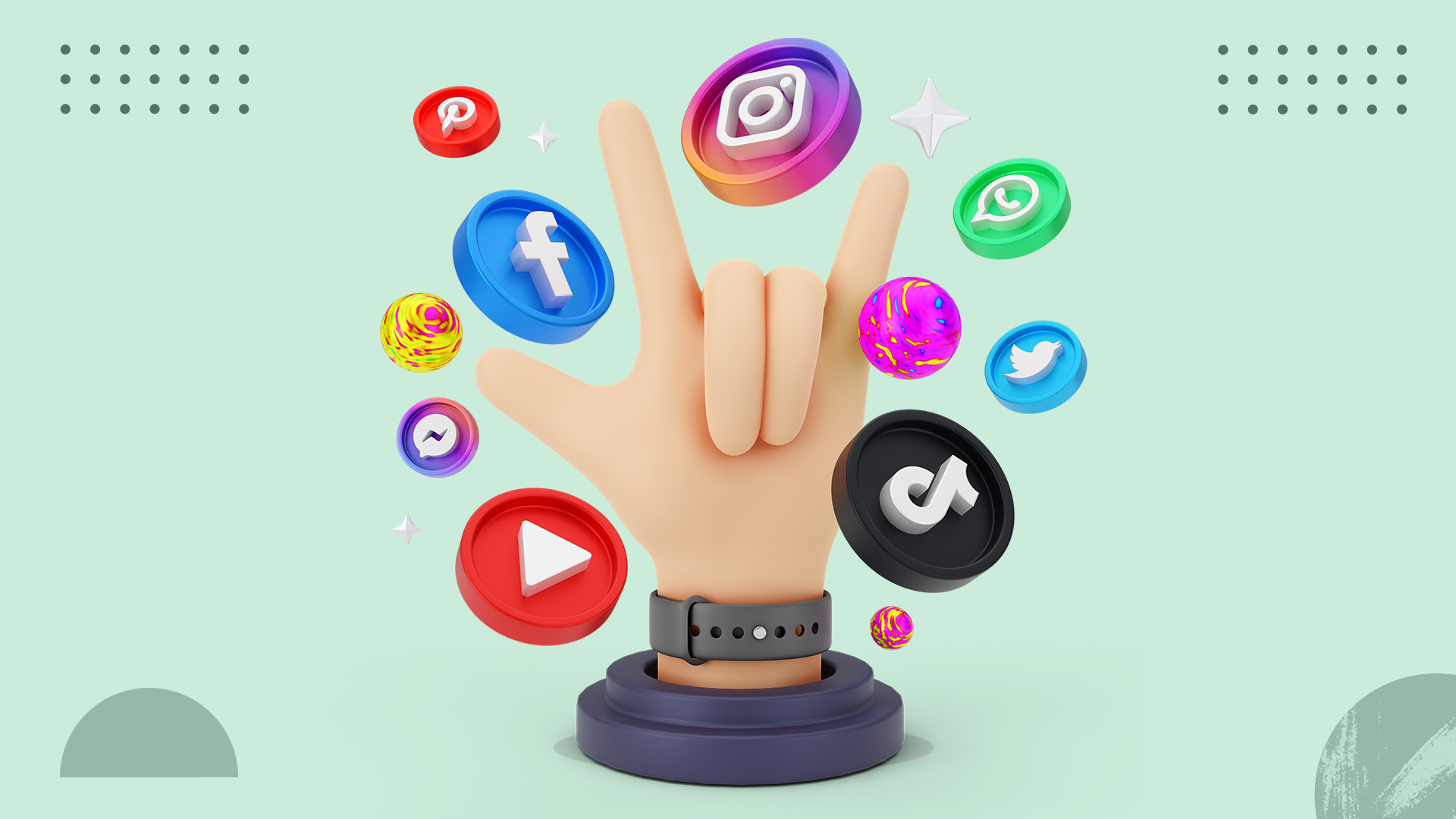Building your brand is impressive, but do you know what is thrilling? Promoting your brand to more than half of the world, Yes! That’s right. According to a 2022 survey, 4.622 billion people use social media. The average daily time spent using social media is 2h 27m. Social media branding is a much easier task if done so by being on a calendar!
You can get your brand promoted through multiple channels such as search engines, pay-per-click, SlideShare, and your personal website. But none of these platforms offer as massive reach as social media platforms offer. There is no denying that you and your social media presence are inseparable. Social media presence helps grow agile marketing, driving traffic, reputation management, prospecting, content ideas, local search, and funnel development. In addition, these platforms connect you with the one-on-one target audience and change visitors into clients.
According to January 2022, these were the top social networks, classified by the number of monthly active users in millions
- Facebook users: 2,910
- YouTube: 2,560
- WhatsApp: 2,000
- Instagram: 1,478
- Tiktok: 1,000
What is Social Media Branding?
Social media branding consistently uses the right techniques to reach and engage the target audience on social media platforms. The terms digital marketing and e-marketing are still dominant in academia. However, branding in social media is becoming more popular for researchers and practitioners. Utilizing social media as a marketing tool, you can build a reliable network of fans who not only follow your brand but want to buy too, increasing the importance of branding for social media.
Related Read: A Complete Guide On Social Commerce for 2022
According to the 2021 Special Sprout Index, some goals of social media branding are brand awareness 71%, Lead generation 47%, customer loyalty 34%, sales 28%, and customer service 17%.
Social media brand management aims to improve brand authenticity to build trust with potential clients, partners, and employees. Successful brands use simple strategies to promote brands online and interact with the target audience. They put focus on delivering quality content as well as engaging with users and tracking their results.
Importance of Branding on Social Media
Social media branding is an incredible opportunity to spread the word about your product and mission. It has amazing business benefits from audience reach to increased conversion. 52% of social media marketers believe social media positively impact a company’s sales and revenue. Social media branding is important because:
Social Media Branding Helps Build Brand Awareness
Social media platforms are user-friendly sites to improve your brand visibility. 91% of marketers claimed to grow with digital marketing. You can produce a wide audience in no time by spending only a few hours on social media platforms. Furthermore, it gets your audience looking at your brand even if they aren’t thinking about your brand or product.
Related Read: How to Use Instagram Reels to Grow Your Business in 2022
Example: Adidas is spreading brand awareness through Twitter account display pictures, tweet hashtags, captions, and product pictures. Smart yet simple enough to catch unintentional sight.
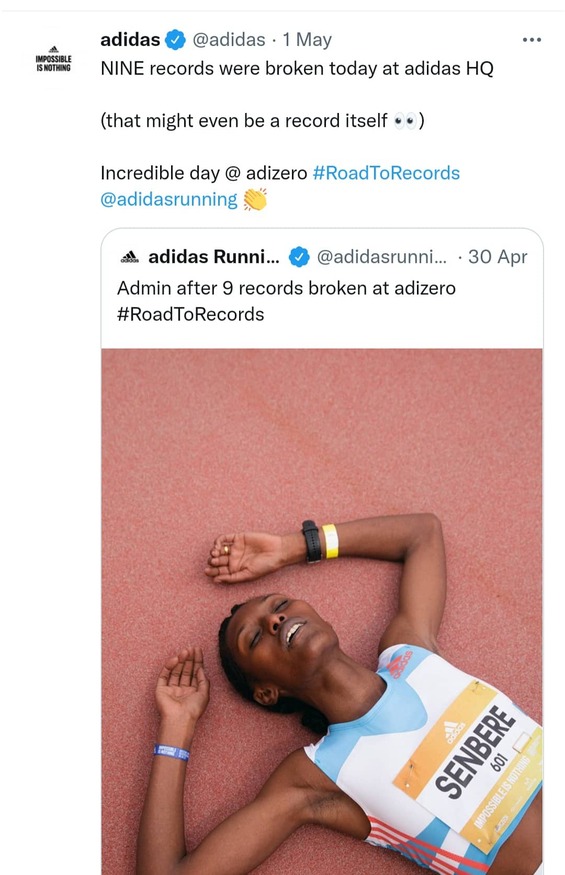
Generate Meaningful Conversions by Social Media Branding
A solid social media strategy will generate conversion about your brand, product, or service.
Example: Let’s take an example of the international clothing brand “Zara”. This exclusive brand is famous for western wear. A few days ago, they shared news and pictures of a newly released cosmetic article #zarabeauty, pink gloss but in low stock. By doing so, they created a state of the emergency among their followers to buy newly released products and received a great number of responses as well. They also got people talking about their makeup line. Followers were having a general conversation, all facilitated by social media.

Build Customer Loyalty With The Help of Social Media Branding
What could be better than winning over people for free? 91% said they purchase from the brand they follow on social media. Customers follow and interact with the brand they enjoy. Don’t forget to keep your target audience happy and engaged. Hence, proving the importance of social media for brands. Here are some ways to keep them around for longer:
- Offer promo codes for discount.
- Ask a question and let audience answer.
- Give away to make long-lasting impressions.
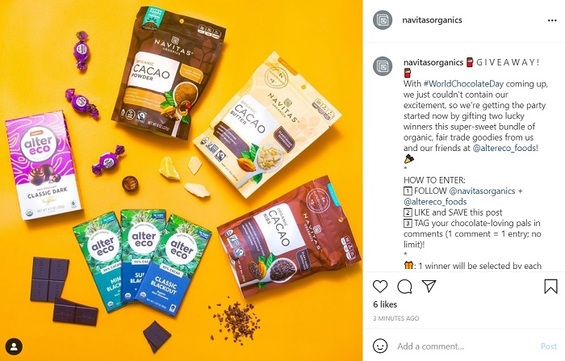
Also know more about How to Use Instagram Reels to Grow Your Business in 2022
Organic Social Media Branding is Cost-Effective
You can reach half of the world without spending a cent, that’s right! Organic social media branding is free. You can create social media profiles, share content, and reach people for free. The quality of content promotes itself. If you want to go the extra mile, you can advertise with paid promotion.
Read Up TikTok Advertising: A Complete Guide to Use TikTok Ads in 2022
Reach Potential Partners and Clients by Branding on Social Media
Social media allows connecting with potential customers. As per the report, 1.8 billion people use Facebook, and the chances of meeting with potential clients are much higher. Likewise, 72% of B2B buyers use LinkedIn to share important information regarding their business. Instagram is expected to grow to be worth over $138 billion and will open the door for incredible reach to your target audience. Social Media funnels also help follow and monitor your competitors to see what new things they are trying to accomplish.
10 Social Media Branding Tips for Brands
Wondering how to use social media to build your brand? Here are 10 tips for you to make use of while branding on social media:
Use Your Brand Name and Logo
The logo leaves a strong impression and builds identity in your audience’s mind. It is memorable and makes a difference between you and your competitors. The logo is the foundation of your brand identity. It is expected by your audience in every social media post. Therefore, don’t forget to add your logo whenever you post anything on social media. It helps promote the company’s product or service and ensures authenticity in the market. Here is a fine tweet by the world’s top automotive brand. Here you can see the brand logo and name on the display picture and the logo on the product again.

Reach Your Target Audience
Recognizing your target audience and connecting with them is very important for social media branding. The content you create can be tailored to a specific persona. That way, you can create content that they will like, comment and share. Treat your fans and followers as real human beings with needs, and in return, you will know how to make relevant content that your audience will relate to. Successful businesses use the demographic information mentioned below to define their particular audience.
- Gender
- Age
- Location
- Profession
- Income
- Education level
- Marital status
Define Goals and Objectives
Marketers can improve social media branding efforts by setting clear objectives and goals. These goals guide your focus on social media platforms and increase local community size. Clear objectives will accurately target your audience, strengthen engagement and increase brand loyalty. Social media goals and objective is a straight path to growing your business.
Businesses should use a SMART strategy (smart, measurable, attainable, relevant, timely)
For example, achieving maximum followers in two months isn’t a smart strategy. But trying to get 500 followers on Instagram in one month is a SMART strategy. Here are some other examples of SMART strategies:
- Trying to increase web traffic up to 25% in 3 months
- Converting 10% more leads from Facebook in one month.
Use Multiple Social Media Accounts for Maximum Results
So, how many accounts should a social media marketer have? To be honest, there is no answer. A number of platforms depend on your target audience and objectives. For social media branding, you might need multiple accounts for multiple purposes, such as LinkedIn for recruiting and Instagram for social commerce, and Facebook for brand awareness. Multiple social media accounts help you reach broader segments of the targeted audience. Besides objective and audience, the type of social media platform also depends on demographic and behaviors.
Here is an example of Jeff Bullas’ presence on social media having multiple accounts:

Related Read: 21 Social Media Posting and Scheduling Tools of All Times
Create a Social Media Content Calendar
A content calendar helps you organize your content regarding what is coming and when it is coming. It also helps maintain consistency. According to Hubspot, companies that publish 16 posts will generate 3.5 times more traffic than those that publish less than four. A content calendar gives you a better perspective on the overall marketing strategy. It keeps you organized and on track.
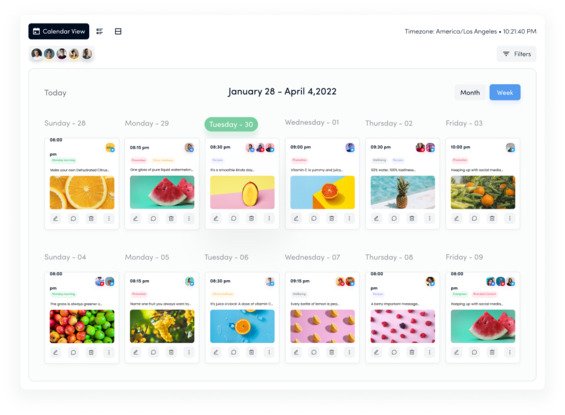
Use Visuals and Infographics in Your Content
Do you know what is killing social media and search engine algorithms right now? The answer is interesting videos, reels, infographics, and IGTV. Instagram and Pinterest are already visual exploding platforms, but you can upload visuals on the rest of the social media platforms, too, for better engagements. Visuals stimulate the audience’s imagination. These are interactive and explain the process.
Tip: You also should use metaphors, GIFs, and animations to engage the audience.
Here is another example of Adidas, how they have answered frequently asked questions with creative GIFs intelligently.

Engage With The Audience and Create Relationships
Followers connect with the brand directly through the social media platform. Therefore, it is very important to respond to them back in a timely manner. Try to engage in conversation and create relationships. Other than the majority, some users may write negative reviews, reply to them back and try to resolve the matter. However, irrespective of good or bad reviews, always place your social listening tools in the right place to track and analyze conversation. Try to reply to your followers in real-time, share relevant posts and memes, and engage with them in stories or comment sections.
Use Scheduling and Automation Tools
Marketers are constantly overwhelmed with the enormous responsibilities of creating content, tracking analytics, and engaging with the audience. However, with the ever-growing social automation tools, it is possible to sit back and relax. Platforms such as Contentstudio enable the marketing team to plan, generate content, and schedule ahead of time. They also make it possible to track results and insights.
Other automation such as chat boxes also exists in social media automation tools. They send automated messages and FAQs to users while they are waiting for the company’s reply. Scheduling and automation tools have freed up social media managers to spend less time uploading individual posts and more time understanding their target audience.
Track Analytics and Identify Your Primary Target Audience
Analytics is an important part of social media branding. It helps to disclose what their target audience cares about and what influences their purchasing decision. These insights allow the marketing department to craft more personalized strategies to win the audience. Every social media platform has its own naïve insights and analytics. For example, who follows the page, who likes the page, what post gets the utmost engagement, location, age, gender, and the optimal time to post? By tracking all insights, you can identify your primary target audience. This will reveal information on which one social media platform you should use to engage with the buyer’s persona. You can now use a number of tools to track your analytics! Here’s a glimpse of how ContentStudio tracks your analytics for you:
Promote and Advertise to Make Your Brand Visible
The effectiveness of social media branding initiatives may be improved by using paid social media campaigns. Social media targeting is sophisticated, allowing campaign managers to micro-target their audience. This targeting takes advantage of both explicit and implicit information. As a result, marketers can increase web traffic, convert readers into leads, and eventually buyers with the help of sponsored content.
Here is the example of manabeautyspirit. Anyone who will click shop now directly goes to the website and might purchase a product or two.

Social Media Branding Examples
Spotify’s Year-Wrapped Campaign
This audio streaming and media provider has an amazing social media branding strategy by including FOMO and personalization in year wrapped campaign. Firstly, in 2019, the app provided a personalized story for each user on its website. You could see how your music taste has developed over the years. Secondly, they also enabled sharing on social media and thus, enhanced the reach of the campaign. Thirdly, people wanted to show off their highlights, thus making more people eager to try this experience. According to Twitter, the campaign was mentioned in at least 1.2 million posts in the month of launch, and there were nearly 3 million streams from the wrapped playlist.

Zoom’s Virtual Background Contest
Zoom became a household name in 2020 when the world was fighting with COVID-19 pandemic. Every sector was doing “work from home” in lockdown. However, backgrounds were not ideal. From messy living rooms to awkward views of your bed, the digital background has become important for some people. So zoom came up with a clever campaign by running content of “unique virtual background .”Zoom made a landing page for entries and a Twitter account to share funny backgrounds. In this way, zoom educated its users about the virtual background and got them excited to use the software.

Airbnb’s Instagram Campaigns
Airbnb is a service that connects property owners and travelers looking to stay. Travelers can book a single room in a fully furnished apartment. Like the majority of brands that invests heavily in creative design, Airbnb has managed to do a lot just by sharing beautiful content. With Airbnb, the customers are the brands, both seller and buyer. If you look at Airbnb’s Instagram account, you will see instantly how does it feel to be in a customer’s shoes. The company understands social media branding. Therefore, they provide links to each and every location displayed in the content. Airbnb’s content is relevant, simple, but smart. They are successful in creating a brand image and winning customers’ trust by producing highly engaging content on their Instagram accounts.

Coca-Cola’s #TogetherTasteBetter Campaign
An emotional and personalized message is an excellent way to win the audience’s attention. In the picture below, Coca-Cola is expertly asking their followers to think about someone who has guided them or given them advice. This campaign #togethertastebetter brought connection in their followers. You should also try to implement a social media campaign that can evoke emotions in your followers, boost leads and conversion, and showcase your brand’s values. It is a win-win situation.
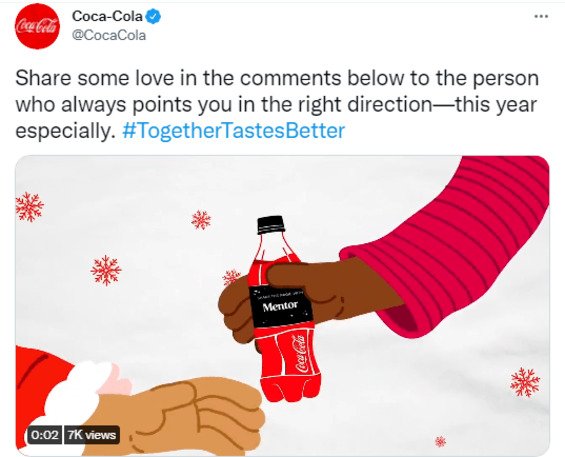
Social Media Branding Mistakes to Avoid
Every brand wants to get the audience’s attention as much as they can. Many love to leverage the power of digital branding. However, in an attempt to stand out, marketers ignore some fundamental aspects of social media branding. Some of these mistakes include:
Being Clueless About Social Media Marketing Strategy
Develop your company’s own social media strategy instead of relying on the hit and trial method. It is an essential aspect of everything that follows. Social media strategy isn’t about the number of posts per day; it is more than that. An effective social media strategy includes clearly defined goals and action plans. It also describes the type of posts, tweets, retweets, URLs, hashtags, images, videos, and tone of your brand.
Not Defining Your Target Audience
Having a generic audience is like shooting in the dark. Suppose you aren’t targeting your particular audience; people who are actually interested in your product might not see your posts. In that case, you will not achieve your desired results no matter how hard you try on social media platforms. Social media is a passageway to reach your buyer marketing persona. Therefore, to get the utmost results, you will need your target audience. Based on your buyer’s persona, identify the different segments of people such as age, gender, city, state, and industry preference)
Ignoring KPIs and Analytics
Social media Insights (KPIs and analytics) are fundamental aspects of performance. To keep improving your social media content engagement, you have to see the impact your old posts had. Insights into what you have done in the past and the results will help you to strategize a marketing plan for the future as well. Find a good analytics tool and assess your performance. By tracking your analytics, you will be in a better place to target your particular audience. Monitor customer engagement, trends, conversions, and your growing influence in your niche on social media.
Treating Every Social Media in The Same Way
As You can’t speak Chinese in Indonesia, in same, you can’t treat every social media in the same way. Social media platforms are unique, and you have to learn each one’s language in order to interact better with the audience. You must understand how social media works so you can drive the utmost results there. Once you learn the social media platform’s algorithm and opportunities, you will start to discover brand new ways to leverage its power.
Avoiding Negative Comments
There is nothing absolute; if 100 people are using your product, there is a chance that ten people won’t like it. Negative feedback is a great way to learn more and improve your performance. It builds trust within your brand. When a client is unhappy, they give negative feedback on social media pages; some brands choose to ignore it, which is a huge mistake. Let’s take an example: if someone has commented negatively and you replied to resolve it and apologize for the inconvenience, there are pretty good chances for the same buyer to use the product again. Engagements can change complaints into loyal customers.
Being Inconsistent in Sharing Social Media Content
Commitment or consistency are pillars of success, and the same mantra goes for social media branding. As soon as you develop a strategy and become a regular poster, not posting a single day can affect your engagement rates. Not being regular means your content can get hidden from the target audience. A social media content calendar is a safe way to arrange for the post earlier. Smart social media marketer schedules their posts automatically and avoids being inconsistent. The regular, the better.
Also, read 17 Worst Social Media Mistakes Marketers Make
Conclusion
We know social media is important like never before, and a new year asks for a new social media marketing plan as the old one is not fruitful anymore. If you feel overwhelmed with creating your social media branding plan for 2022, these tips can help you streamline your strategy with excellent results. This blog has all the core information about social media branding, tips, example, and what not to do.
If you need extra help, we’re always here to assist!
FAQs
How can social media be used to create a brand image?
Social media is public, and it can amplify brand image. First, people can see brand-client interaction. Micro-targeting is also helpful in reaching your target audience. Secondly, brand awareness is easy to spread through social media platforms that, in return, create a brand image.
How do I brand myself on social media?
You can optimize your account, share regular, relevant content, try to engage with the audience and keep an eye on analytics. Some primary and basic steps will be enough to brand yourself on social media.
What do you need for social media branding?
Here are five fundamental steps for social media branding
- Cover your basics; brand name, logo, optimized profiles
- Extend your visual branding
- Develop your marketing strategy
- Establish your brand tone
- Create multiple social accounts for different objectives
How do brands use social media?
Brands use personalized campaigns to evoke emotions. They also use social media influencers to reinforce their marketing campaign, position new products and support the positioning of an existing product.
